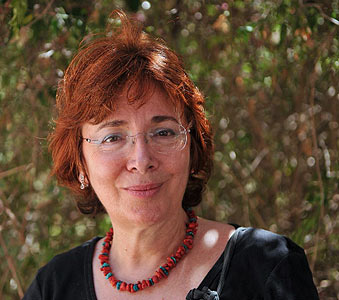Dalia’s Letter to Bashir
Dear Bashir,
We got to know each other 20 years ago under unusual and unexpected circumstances. Every since, we have become part of each other’s lives. Now I hear that you are about to be deported. Since you are in detention at present, and this may be my last chance to communicate with you. I have chosen to write this open letter. First I want to retell our story.
After the Six-Day War, you came with two other people to see the house in Ramle where you were born. This was my first encounter with Palestinians. My family and I had been living in that home since 1948, just after your family was forced to leave- you were a child of six then, and I was a year old. We had come to the new state of Israel together with 50,000 other Bulgarian Jews, and your house was considered “abandoned property.”
Following your first visit in 1967, I accepted your invitation to visit you in Ramallah, where I found myself surrounded by hospitality. We talked for hours and established a warm personal connection. However, it became clear that our political views were very far apart. Each of us saw the through the lens created by the suffering of his own people.
But some change in perspective was beginning to take place in me. One unforgettable day, your father came to our house in Ramle, accompanied by our brother. Your father was then old and blind. He touched the rugged stones of the house. He then asked if the lemon tree was still in the backyard. He was led to the abundant tree, which he had planted many years before. He caressed it and stood silent. Tears were rolling down his face.
Many years later, after the death of your father, your mother told me that, whenever he felt troubled at night and could not sleep, he would pace up and down your rented apartment in Ramallah, holding a shriveled lemon in his hand. It was the same lemon my father had given him on that visit.
Ever since I met you, the feeling has been growing in me that home was not just my home. The lemon tree which yielded so much fruit and gave us so much delight lived in other people’s hearts too. The spacious house with its high ceilings, big windows and large grounds was no long just an “Arab house,” a desirable form of architecture. It had faces behind it now. The walls evoked other people’s memories and tears.
It was very painful for me, as a young woman 20 years ago, to wake up to a few then well hidden facts. For example, we were all led to believe that the Arab population of Ramle and Lod had run away before the advancing Israeli army in 1948, leaving everything behind in a rushed and cowardly escape. This belief reassured us. It was meant to prevent guilt and remorse. But after 1967, I met not only you, but also an Israeli Jew who had personally participated in the expulsion from Ramle and Lod. He told me the story as he had experienced it, and as Yitzhak Rabin later confirmed in his memoirs.My love for my country was losing its innocence. It was taking on new dimensions. While I was learning to live with these painful facts, you were imprisoned. You were charge with planting a bomb that killed several civilians. My heart aches for those murdered even now. For your crime, you sat in prison for fifteen years. Passing the Ramle prison on my way to work, I often wondered you were there. I never had the courage to ask. It was too painful.
After my marriage and the death of my parents, I inherited the house in Ramle. I shared our story with my husband, and he and I both felt that we wanted to dedicate that house-to some healing purpose. We wished to do this in conjunction with you but we did not know whether this was at all possible. Following your release from prison, we sought you out and met you. I felt that you and I, your family and mine, were bound by as strange destiny, that the house with which our childhood memories were connected had forced us to face each other. However our conversations revealed that, despite the passage of time, your basic position had not changed- and this makes it impossible to find common ground. Perhaps some day, if we are both willing to make sacrifices, some kind of mutual forgiveness may yet emerge.
If you could disassociate yourself from your past terrorist actions, your commitment to your own people would gain true moral force in my eyes. I well understand that terror is a term relative to a subjective point of view. Some of Israel’s political leaders were terrorists in the past and have never repented. I know that what we consider terror from your side, your people considers their heroic “armed struggle” with the means at their disposal. What we consider our right to self-defense, when we bomb Palestinian targets from the air and inevitably hit civilians, you consider mass terror from the air with advanced technology. Each side has an ingenuity for justifying its own position. How long shall we perpetuate this vicious circle?
The first step out of this deadlock is to free ourselves from self-justifying moral relativism. We are taught that the essence of our Jewish tradition can be encapsulated in the following teaching: What is hateful to you, do not do unto others.” Unless both Israelis and Palestinians can embrace this basic human principle, we will not have a solid foundation for coexistence. That foundation entails the right to self-determination for both peoples.
You, Bashir, are a Habash supporter, rejecting the self determination of my people in this land. Most Israelis feel that the planting of bombs, as well as the throwing of stones by Palestinians is not just an expression of resistance to the occupation, but is a much deeper refusal to accept a Jewish state in even part of Palestine. As long as we experience this total rejection, you and your people will not achieve your own independence. For you will alienate all those Israelis whom, like myself, are prepared to support the Palestinian struggle for self determination. People like yourself, Bashir, bear a great responsibility for triggering our anxieties which are well justified, given the PFLP’s determination to replace Israel with a “secular democratic state” and to use terror to achieve this aim.
Regardless of what you may have done recently to displease the military government, deportation is a violation of human rights and is therefore counterproductive for Israel. Not only do the expulsions create greater bitterness and extremism among the Palestinians, thereby escalating the violent confrontations, but the deportees will have greater freedom to plan actions against Israel from abroad. You, Bashir, have already experienced one expulsion from Ramle as a child. Now you are about to experience another from Ramallah forty years later. You will thus become a refugee twice. You may be separated from your wife and your two small children, Ahmed and Hanin, and from your elderly mother and the rest of your family. How can your children avoid hating those who will have deprived them of their father? Will the legacy of pain grown and harden with bitterness as it passes down the generations?
It is a natural reaction to hate those who have made us suffer. It is also a natural reaction to inflict pain because one has suffered pain, and to justify it ideologically. In this small land, both our peoples are stuck in a fateful embrace. I believe that our finding each other here is potentially for the greater unfolding of life. In order to fulfill this potential, we all need to become more fully human, which to me, means activating our capacity to understand the suffering of others through our own, and to transform pain into healing.
It seems to me, Bashir, that you will now have a new opportunity to assume a leadership role. By its intention to deport you, Israel is actually empowering you. I appeal to you to demonstrate the kind of leadership that uses nonviolent means of struggle for your rights; a leadership based on education for the recognition of your enemy and his relative justice.
I appeal to both Palestinians and Israelis to understand that the use of force will not resolve this conflict on its fundamental level. This is the kind of war that no one can win, and either both peoples will achieve liberation or neither will.
Our childhood memories, yours and mine, are intertwined in a tragic way. If we can not find means to transform that tragedy into a shared blessing, our clinging to the past will destroy our future. We will then rob another generation of a joy-filled childhood and turn them into martyrs for an unholy cause. I pray that with your cooperation and God’s help, our children will delight in the beauty and bounties of this holy land.
Allah ma’ak-may God be with you.
Related:

 Summer Camp 2024
Summer Camp 2024 Summer Camp 2023
Summer Camp 2023 Summer Camp 2022
Summer Camp 2022 Summer Camp 2021
Summer Camp 2021
